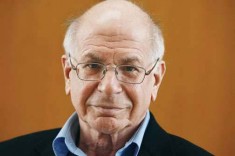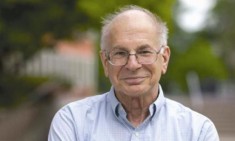| Daniel Kahneman | |
|---|---|
 |
|
| Psychologist | |
| Born | Mar. 5, 1934 (age 79) Tel Aviv, Mandatory Palestine |
| Nationality | Israeli-American |
Daniel Kahneman achieved an honor that is quite unique for someone who works in the field of psychology. He won the 2002 Nobel Memorial Prize in Economic Sciences. His unique focus on areas related to judgment, economic behavior, and decision-making has allowed him to become one of the more influential and unique psychologists in modern history.
Early Years
Daniel Kahneman was born on March 5, 1934, in Tel Aviv. He was actually born there while his mother was visiting relatives. His parents were originally from Lithuania and had immigrated to Paris, which is the city in which the young Kahneman grew up. He and his family were living in Paris in 1940 when it fell to the Nazi occupation.
The family fled through the city to escape persecution at the hands of the German troops. In 1948, Kahneman and his family moved to Palestine right before the establishment of the state of Israel. The frightful experiences Kahneman suffered during the Nazi occupation never left him and, to a degree, contributed to his interest in studying psychology.
Formal Educational Years
Kahneman invested his time and energies in a formal education at the Hebrew University of Jerusalem. In 1954, he graduated having earned a B.S. Degree in Psychology. Soon after, he served in the psychology division of the Israeli Defense Forces.
Kahneman would go on and continue his education in the United States. He enrolled in the prestigious University of California at Berkeley in 1958 with the goal of attaining a Ph.D. in Psychology.
Professional Career
Daniel Kahneman returned to Hebrew University three years after entering Berkeley. His role at the university was not as a student, but as a lecturer. He went on to become a visiting scientist at the University of Michigan and later Cambridge. Kahneman also served as a fellow at Harvard.
The early work of Kahneman centered on perception and attentiveness. The 1966 work Pupil Diameter and Load on Memory published in Science Journal was one of his first major articles on the subject. He went on to publish papers on topics that he would become much better known for: judgment and decision-making.
 Kahneman collaborated with Amos Tversky on these subjects. The first work the two collaborated on together was the paper Belief in the Law of Small Numbers. Their most well-regarded research centered on prospect theory. Published in 1979, their paper on prospect theory centered on a behavioral economic theory that noted some people are more geared towards risks where the probability of an outcome is better known.
Kahneman collaborated with Amos Tversky on these subjects. The first work the two collaborated on together was the paper Belief in the Law of Small Numbers. Their most well-regarded research centered on prospect theory. Published in 1979, their paper on prospect theory centered on a behavioral economic theory that noted some people are more geared towards risks where the probability of an outcome is better known.
Decisions end up being based on what the value of losses and gains are instead of just the final outcome. Kahneman’s 2002 Nobel Memorial Prize in Economics was awarded for his work surrounding prospect theory.
Moving Towards Hedonic Psychology
After spending an enormous amount of time and research in traditional economics-related psychology, Kahneman shifted in a different direction and commenced work in the 1990s on research related to hedonic psychology. Hedonic psychology centers on the happiness of economics. This area of psychology looks at the well-being of people based on their economic situation and whether or not they are achieving happiness.
In a sense, this area of psychology combines economics with sociology as it studies the effects on economics on people. The positive psychology movement was in full force in the 1990s and this may have played a role in Kahneman’s decision to focus on this area. In many ways, hedonic psychology is really not about economics as much as it is about quality of life. Economics does play a vital role in whether or not one is happy with life and Kahneman brings forth unique knowledge about economic to the study of hedonic psychology.
Kahneman’s Career Continues
Despite a long and distinguished career, Daniel Kahneman has not opted to retire. He is still working in the academic field. Currently, he is a senior scholar at Princeton University. Kahneman is also a fellow at Hebrew University. He is a Gallup senior scientist and a faculty member emeritus at the Woodrow Wilson School of Public and International Affairs.